Memories of Moscow 1980: A Games Of Many Monsters Of The Waves In A Sea Of Harm & Heist
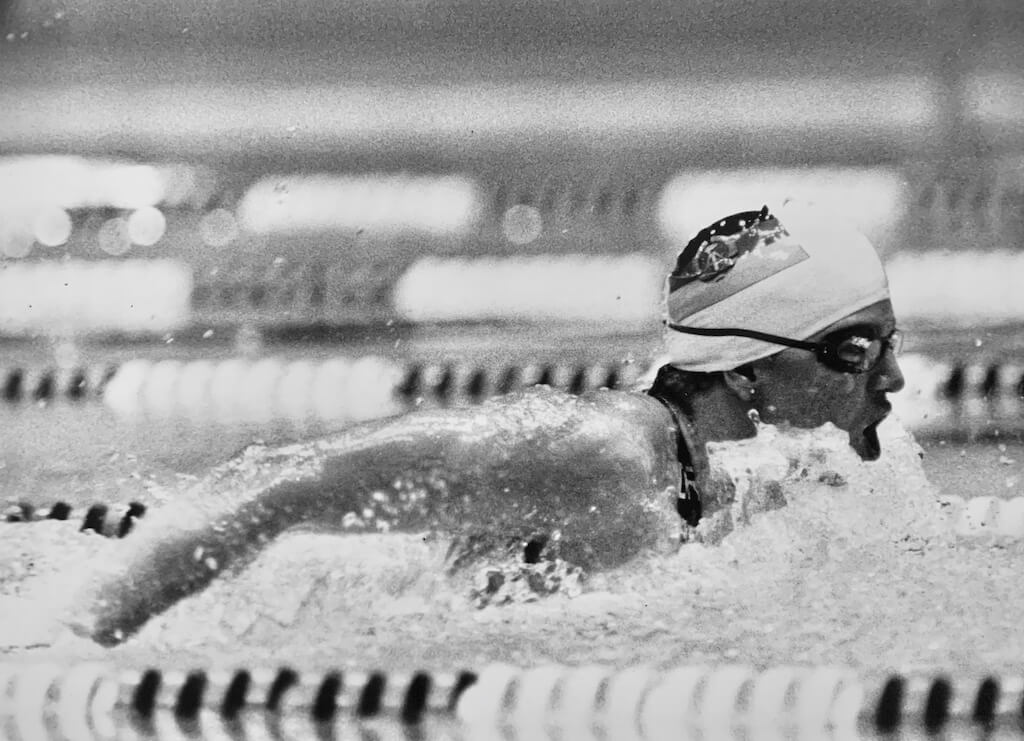
We end our memories of the boycotted Moscow 1980 Olympic Games with an overview of the swimming events, the truth that emerged down the years and a review of the races over the closing two finals sessions of the meet and where they left the protagonists, at that moment and in the long-term of life
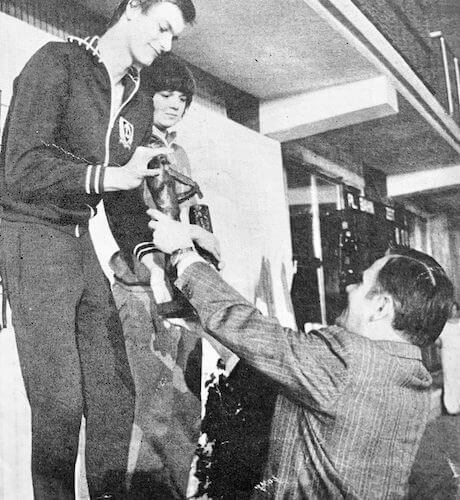
Jörg Woithe, left, receives the GDR Male Swimmer of the Year Award from one of the architects of State Plan 14:25, Manfred Ewald, as Petra Schneider, one of the medals beneficiaries but victims of that plan, looks on ahead of being handed the equivalent Women’s award. – Photo Courtesy: NT/CLArchive with permission
MOSCOW 1980 – July 21–27: Nations: 41; World Records:10 (M: 1 W: 9)
Medals at a glance:
- GDR 12 9 7
- URS 9 8 5
- AUS 2 1 6
The boycott of the 1980 Games in Moscow over the Soviet invasion of Afghanistan and the War that ensued, was opposed by swimmers, their parents and coaches who had worked hard for the big moment, as well as federations and fans far and wide. The political action had significant impact in swimming: it altered careers and the status of swimmers and coaches, not just for the moment but for a lifetime; it produced a set of results that did not reflect the state of world rankings, and therefore the sport of swimming in 1980, with athletes outside the top five in the world by the close of that year, celebrating Olympic gold in the Soviet capital – and for the rest of their lives.
Good came of that, too, as we saw in the stories of Duncan Goodhew and his role in spreading the word on anti-bullying. On the whole, however, the damage done by events in 1980 remains permanent, the scars, different in nature for different protagonists, felt to this day.
The picture to the right, supplied to the late father of World Rankings Nick Thierry by contacts in the GDR, is telling: it shows the Male and Female Swimmers of the Year, Jörg Woithe and Petra Schneider with Manfred Ewald.
There is a slightly skeptical look on the face of Schneider, who at the time would have realised, even as a teenager, that Ewald was a part of the machinery of life in the German democratic Republic, with its network of spies watching spies, neighbours watching neighbours and many reporting on each other to find favour in a system so insecure that it believed in a Wall that kept people in.
What Schneider did not know at the time was that from the age of 12, the little blue pills that came with minerals and vitamins and the less regular injections to “help with recovery”, were steroids that caused androgenisation. In the company of other girls and women, she was the one who had the edge of a boy. Men were also a part of State Plan 14:25, a systematic doping program rolled out to an estimated 10,000 athletes across all sports that might benefit from the strength, the endurance, the edge over rivals sought by politicians and the coaches rewarded if they played the game and Games.
Ewald, whio died aged 76 in 2002 soon after he was handed a criminal conviction for being an accessory to “intentional bodily harm of athletes, including minors”,served as GDR Minister of Sport (1961–1988) and was president of his country’s Olympic committee (1973–1990).
He was a servant of the communist regime but a man who blew with the wind when it came to convictions. Ewald was born in Podejuch, then the Province of Pomerania, in Weimar Germany (today, the place is Podjuchy, a municipal neighborhood of the city of Szczecin in Poland).
Ewald was a member of the Hitler Youth, the Nazi party and, after World War II, the Socialist Unity Party (also known as the Communist Party). He was captured by the Soviet Red Army in 1944. His revenge would be taken through sport, the pain of athletes and the trauma that would ripple out from victims and winners at home to ‘losers’ in the wider world.
Ewald was awarded the Olympic Order by the International Olympic Committee (IOC) in 1983 – and read out during the 23rd session of Olympic bosses during the boycotted 1984 Olympic Games in Los Angeles. The IOC lists yet the honour granted to Ewald and other GDR functionaries at the heart of the Sporting Crime of the 20th Century.
FINA, the international swimming federation, took the same line of wilful blindness: Dr. Lothar Kipke, member of the FINA Medical Committee, retains his Silver Pin award for services to swimming. Ewald, who tub-thumped for clean sport beyond the Berlin Wall, while working hard at doping teenage athletes back home with Oral Turinabol and some substances that had not been put through clinical trials before being fed to “lesser athletes” for testing, was so brutal in his administration of injections to teenage girls that his Stasi (state police) watchers reported him to the boss who would be convicted with him.
The Two Manfreds & Their Monstrous Work
Ewald defended his role in sports doping in his 1994 book bearing the arrogant title Ich war der Sport [I Was Sport]. German judges begged to differ, after streams of athletes and some others, including a few doctors prepared to tell the truth brought their stories to the Doping Trials of 1998-2000:
On July 18, 2000, in Berlin, Manfred Ewald and Dr. Manfred Höppner, East Germany’s top sports doctor, were convicted as accessories to “intentional bodily harm of athletes, including minors.” Both received probation and fines. During the trial, Höppner testified that they had received approval from the highest level of government. They were, as many a camp guard noted, “only following orders”. The truth was that they were a part of the architecture of deception and damage.
Moscow 1980 – The Result That Was and the Many What Ifs
Of the 13 men’s swimming events at Moscow 1980, nine were won in times slower than those achieved in Montreal in 1976, the historic sub-15-minute victory in the 1,500m freestyle by home hero Vladimir Salnikov the only world record to fall among men. The distance ace claimed three gold medals (400m, 1500m and 4x200m freestyle with Soviet teammates) and earned the nickname “Monster of the Waves” because of his excellence in a pool surrounded by monsters of other kinds.
The builders of East German women ensured that all 13 finals barring the 100m butterfly were won in times faster than the 1976 champions had swum. The GDR also accounted for all nine world records set by women, with Rica Reinisch, who took four world records and three gold medals for the biggest performance of the pool at Moscow 1980.
The six other world records came from Barbara Krause (100m freestyle in heats and finals), Ute Geweniger (100m breaststroke), Petra Schneider (400m medley) and the 4x100m freestyle and medley quartets.
Three entries per nation per event countered the low numbers entered in Moscow, and led to six East German medal sweeps.
Events at the pool in the Olympic Lenin Park Complex were the first at which the Omega Timing system was, to all intents and purposes, fully automatic. Of the 41 nations entered, 39 sent men and 30 sent women. The Games went without the likes of the United States, Canada and West Germany, while swimmers from several nations raced under the ‘neutral’ Olympic Flag instead of their national flags. Olympic waters in 1980 saw the first swimmers from Algeria, Angola, Cyprus, Libya, Madagascar and Mozambique.
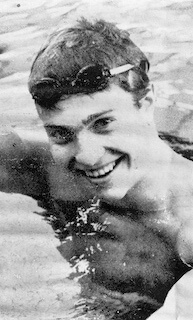
Vladimir Salnikov – Photo Courtesy: NT/CLArchive
Not a single race was unaffected by boycott. On freestyle, the 100m was won by Jörg Woithe (GDR) in 50.40, fourth fastest time in 1980 and down on the 49.61 annual best of Rowdy Gaines (USA). Sergei Kopliakov (URS) claimed the 200m in an Olympic record of 1:49.81. Salnikov was supreme in the distance events but raced in the absence of some of those who might have provided a challenge, including Brian Goodell, the 1976 Olympic champion in the 400m and 1,500m, as well as 400m World record holder Peter Szmidt (CAN).
Bengt Baron (SWE) claimed the 100m backstroke (56.33), ahead of Viktor Kuznetsov (URS), who was back from serving a suspension for a positive steroids test. The 200m backstroke title went to Hungary for the first time, Sandor Wladar, today the President of the Hungarian Swimming Federation, getting the touch 2:01.93 to 2:02.40 over teammate and 1975 World champion Zoltan Verraszto. At the US nationals, Steve Barnicoat and Peter Rocca timed in at 2:01.06 and 2:01.34.
The 100m breaststroke was won by Goodhew in 1:03.44. Among those missing were Americans Steve Lundquist and Bill Barrett, who clocked 1:02.88 and 1:02.93 a week after the Games in Moscow, and an in-form Gerald Moerken, West German world record holder in 1:02.86. The 200m breaststroke was won by Robertas Zulpa (URS) in 2:15.85, slower than David Wilkie‘s winning 2:15.11 of 1976. The 400m medley was another case in point, Alexander Sidorenko (URS) claiming the Olympic crown in 4:22.89, compared with the world record of 4:20.05, held by Jesse Vassallo (USA), who three days after the Moscow final claimed his national title in 4:21.51.
The butterfly finals saw Par Arvidsson (SWE) win the 100m in 54.92, 0.77sec outside his own world record, and Sergei Fesenko (URS) the 200m in 1:59.76. William Paulus and Matt Gribble (USA) and a young Michael Gross (FRG) all swam faster in the 100m within a week of the Games, while Craig Beardsley (USA) was among those for whom the decision to boycott was disastrous.
In 2005, Beardsley, who set a world record of 1:58.21 in the 200m butterfly 10 days after the Olympic final took place without him, told USA Today, lump audible in throat:
“You meet people, and once they find out you were a swimmer, they usually ask, ‘Did you go to the Olympics?’ It’s never an easy answer, and there’s always a footnote. When they ask, ‘Oh, did you get a medal?’ It’s kind of hard to tell them that I was not there because then you have to go into the whole story, and the last thing I’m looking for is sympathy.”
His tale was all the more tragic when events of 1984 are taken into account: he missed making the 1984 Olympic team by 0.36 of a second. “I was devastated,” he said. He and his family went on holiday to Hawaii and did not turn on the television.
A potential multi-medal winning performer at her peak, Tracy Caulkins, told the same publication:
“What really hits home to me about the boycott was the Soviets didn’t pull out of Afghanistan for nine years. Did it put any pressure on them? No, it was just a missed opportunity for many athletes. It just doesn’t seem fair.”
Caulkins, who would surely have provided a rattling race for Schneider as she trounced rivals by more than 10 seconds in the 400m medley, was joined on the damaged-by-boycott list by world records holders Mary T. Meagher, Sippy Woodhead, Kim Linehan, all USA, and Tracey Wickham (AUS), who took a personal decision not to attend the Games even though Australia was represented.
Wickham’s arch-rival at home, Michelle Ford , was one of only two women to keep the GDR from gold. The 800m freestyle title went to the Australian in an Olympic record of 8:28.90. Linehan clocked 8:27.86 two days later in the US and a great race was lost, one that with Wickham and Woodhead in peak form would have held the spice of epic. The other non-GDR champion was home hero Lina Kachushite at the helm of a Soviet medals sweep that continued a great tradition that was killed off by the 1984 Olympic boycott: since 1980, no Russian woman has reached the Olympic podium.
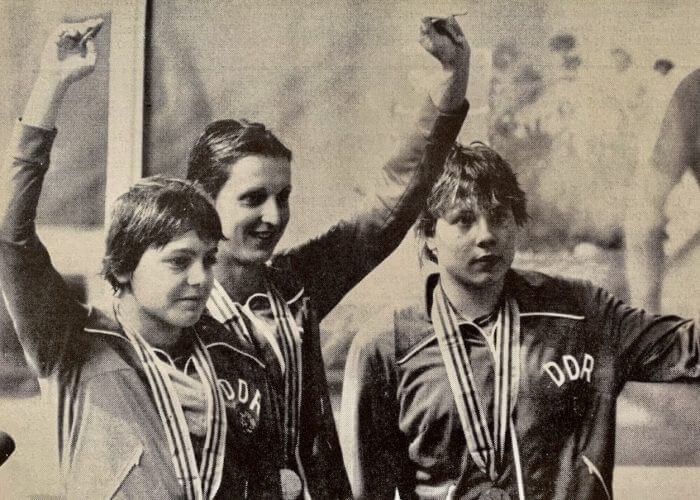
GDR sweep – l-r – Ines Diers, champion Barbara Krause and Carmela Schmidt- Photo Courtesy: NT/CLArchive
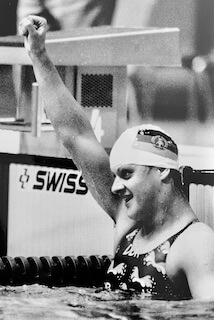
Caren Metschuk – Photo Courtesy: NT/CL-archive
The GDR sweeps in Moscow came in the 100m, 200m and 400m freestyle, the 100m and 200m backstroke and the 100m butterfly. In 2007, Geweniger and Schneider were asked about the meaning of their medals and records, given the fact that their performances had been enhanced. Both women believed that they had a right to keep their medals because they felt it right to have their work recognised.
There was, they said, no way of telling who else might have had medical assistance. What is certain is that the GDR regime dictated a heavy workload of up to six hours a day of physical training, with periods of cross-country skiing and other cross-training exercise part of the mix. The hard work, the speedy recovery in between sessions: fuelled by the doping designed to give GDR athlete the winning edge they often took.
When it came to the records, the medley world record holders differed: Schneider, a coach and swim teacher in Chemnitz, called on a reunified Germany to start a fresh record book, while Geweniger was keen to keep all her prizes and records – and got her way when the DSV, the German swimming federation, took the astonishing decision to adapt all of the GDR records as the record of a unified Germany.
Schneider was among those who faced her abusers in court in 1999 and received token compensation for the crimes committed against her. Years of suffering severe side effects of the steroids followed retirement from racing. Speaking at her home, with boxes of tablets and treatments piled up on a cupboard nearby, she told this author in 2007:
“Everyday I have to take medicine for the health problems caused by the things they gave me.”
Her sentiment was echoed by Reinisch when facing her abusers in court in 1999:
“I live with pain constantly. I have inflammations of my ovaries, I have had two miscarriages, I am required to take beta-blockers for my heart arrhythmia. I live with pain daily.”
The last two days of finals at Moscow 1980 – Potted Reviews
Day 7
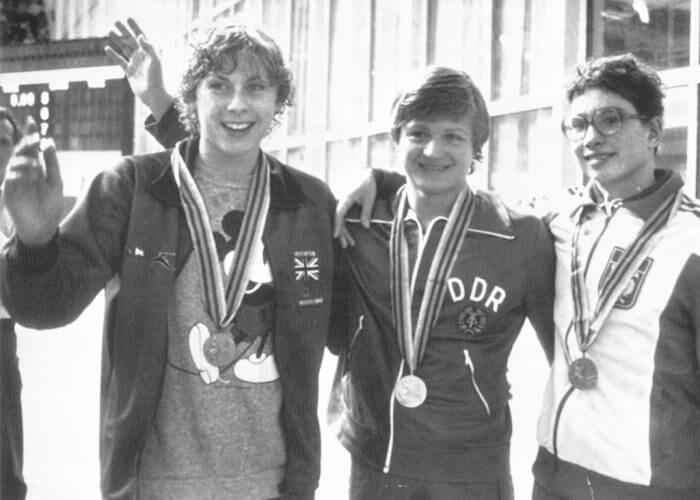
The 400IM podium l-r: Sharron Davies, Petra Schneider and Agnieska Czopek – Photo Courtesy: Sharron Davies
Moscow 1980 – Women 400m Individual Medley – Athletes: 23 Nations: 17
- 4:36.29wr Petra Schneider GDR
- 4:46.83 Sharron Davies GBR
- 4:48.17 Agnieszka Czopek POL
4:48.54 Grit Slaby GDR
4:49.18 Ulrike Tauber GDR
4:49.25 Sonya Dangalakova BUL
4:50.91 Olga Klevakina URS
4:53.30 Magdalena Bialas POL
Date of final: July 26, 1980
The US-led boycott of the Games in Moscow deprived Tracy Caulkins (USA) of her first try at Olympic gold two years after she won five gold medals at the World Championships.
The final of the 400m medley saw Petra Schneider (USA) crush her opponents with splits of 1:01.72, 2:12.12 and 3:32.19 on her way to a staggering world record of 4:36.29 that left her challengers more than 10sec off the pace. The silver went to Sharron Davies (GBR) and the bronze to Agnieszka Czopek (POL), in 4:46.83 and 4:48.17 respectively. On July 30 at US national championships, Caulkins, one of the most versatile swimmers in history, clocked 4:40.61.
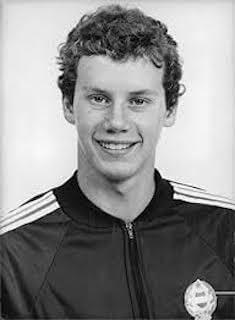
Sandor Wladar
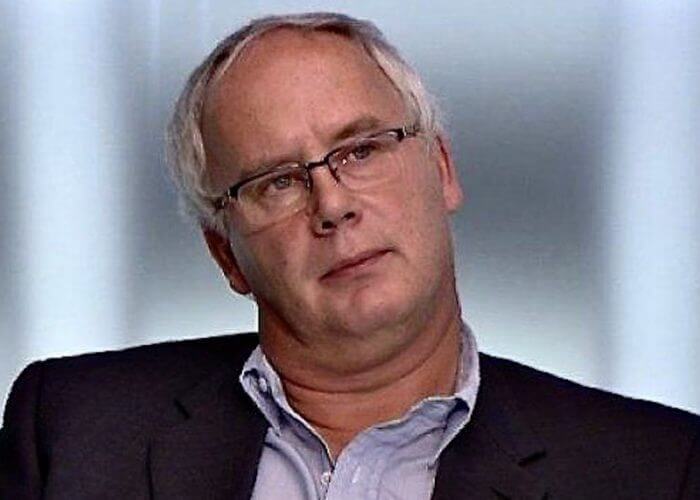
Sandor Wladar – Hungarian Swimming Federation
1980 Moscow – Men 200m Backstroke: Athletes: 25 Nations: 16
- 2:01.93 Sandor Wladar HUN
- 2:02.40 Zoltan Verraszto HUN
- 2:03.14 Mark Kerry AUS
2:03.48 Vladimir Shemetov URS
2:03.92 Fred Eefting NED
2:04.10 Michael Soderlund SWE
2:04.23 Douglas Campbell GBR
2:06.15 Paul Moorfoot AUS
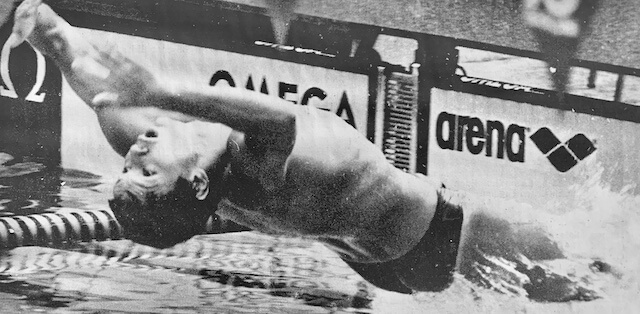
Zoltán Verrasztó – Photo Courtesy: NT/CLArchive with permission
Date of final: July 26, 1980
Events in the pool at the 1980 Games in Moscow suffered because of a US-led boycott. The 200m podium was slower than the 1976 medal-winning efforts and only just ahead of the standard of the leaders in 1972. The final saw Hungary celebrate a one-two finish, Sandor Wladar and 1975 world champion Zoltan Verraszto becoming the first from their nation to win Olympic medals of any colour in the 200m backstroke, while Mark Kerry (AUS) claimed the bronze to become the first Australian to win an Olympic medal in the four-length race. Three days after the Moscow final, the US national title went to Steven Barnicoat in 2:01.06, ahead of Peter Rocca, the 1976 silver medallist in the 100m, in 2:01.34. The world record stood at 1:59.19 to retired 1976 champion John Naber (USA).
Today, Wladar is the President of the Hungarian Swimming Federation, while Dr. Zoltan Verraszto helped to coach his daughter, Evelyn, and son, David, to world-class status and International podiums in the pool.
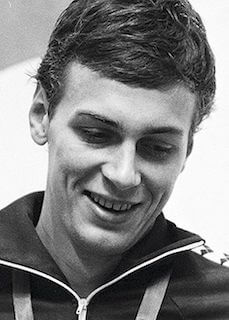
Robertas Žulpa
1980 Moscow – Men 200m Breaststroke: Athletes: 19 Nations: 14
1 2:15.85 Robertas Zhulpa URS
2 2:16.93 Alban Vermes HUN
3 2:17.28 Arsen Miskarov URS
2:19.64 Gennadi Utenkov URS
2:19.68 Lindsay Spencer AUS
2:20.92 Duncan Goodhew GBR
2:21.65 Peter Berggren SWE
2:22.39 Jorg Walter GDR
Date of final: July 26, 1980
Events at the 1980 Games in Moscow were affected by the US-led boycott. Of the eight finalists at the World Championships in 1978, the gold and bronze medallists were missing. However, the Olympic crown went to a man who had improved a vast amount in the build-up to a home Games: Robertas Zhulpa (URS) finished fifth in the 1978 final on 2:20.53. In Moscow, he claimed the crown in 2:15.83, the world and Olympic record of David Wilkie (GBR), of 2:15.11 from 1976, safe.
Zhulpa split the 100m in 1:05.94, 0.55sec inside Wilkie’s world-record pace but the Scot’s strength had been a phenomenal second half. Alban Vermes (HUN), sixth in 1978 just behind Zhulpa, claimed silver in 2:16.93, while the world silver medallist Arsen Miskarov (URS) took bronze. At US nationals, Glenn Mills, John Moffet and John Hencken led the way, in 2:17.78, 2:18.79, and 2:19.09.
Day 8
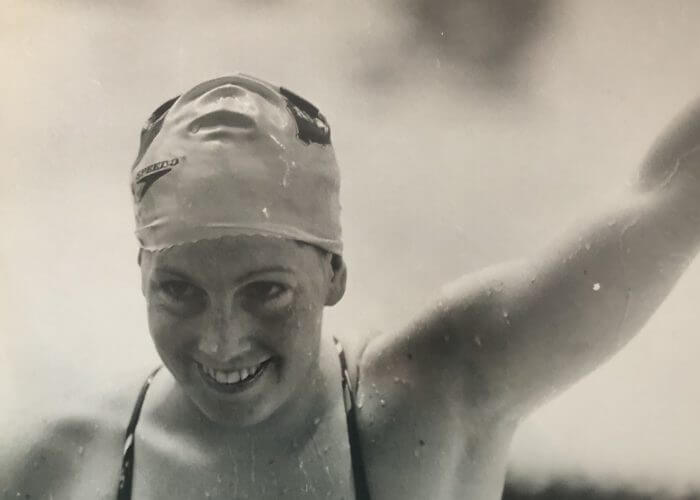
Michelle Ford – Photo Courtesy: Michelle Ford
1980 Moscow – Women 800m Freestyle – Athletes: 22 Nations: 14
- 8:28.90or Michelle Ford AUS
- 8:32.55 Ines Diers GDR
- 8:33.48 Heike Dahne GDR
8:38.05 Irina Akysyonova URS
8:42.04 Oxana Komissarova URS
8:44.84 Pascale Verbauwen BEL
8:45.28 Ines Geissler GDR
8:46.45 Yelena Ivanova URS
Date of final: July 27, 1980
In the absence of world record holder Tracey Wickham (AUS), who had chosen not to travel to the Games for personal reasons, the title went to former teammate and arch domestic rival Michelle Ford, in 8:28.90. Her victory was one of only two titles that did not go to East Germany. The other was the 200m breaststroke crown, which went to Lina Kachushite at the helm of the second-successive Soviet clean sweep in that event at the Olympic Games. Two days later in the US, Kim Linehan claimed her national title in 8:27.86.
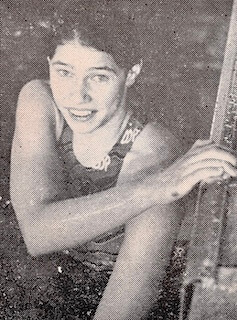
Rica Reinisch – Photo Courtesy: CL/NTArchive, with permission
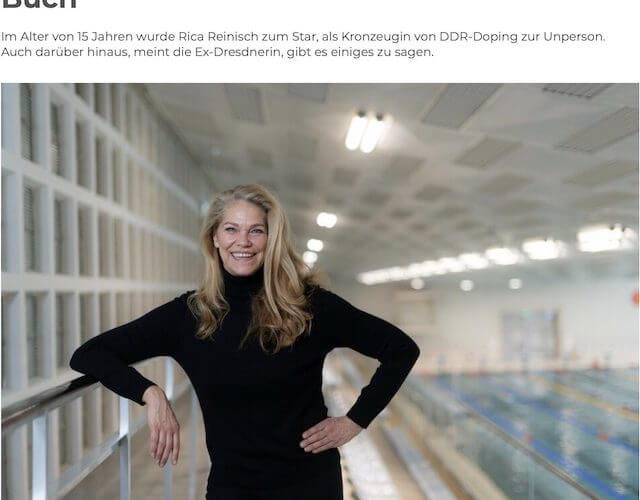
Rica Reinisch, 2020 – Photo Courtesy: Sächsische Zeitung (ragout)
1980 Moscow – Women 200m Backstroke – Athletes: 21 Nations: 13
1 2:11.77wr Rica Reinisch GDR
2 2:13.75 Cornelia Polit GDR
3 2:14.14 Birgit Treiber GDR
2:15.20 Carmen Bunaciu ROM
2:15.58 Yolanda Van der Straten BEL
2:16.66 Carine Verbauwen BEL
2:16.75 Lisa Forest AUS
2:17.72 Larissa Gorchakova URS
Date of final: July 27, 1980
At 15, Rica Reinisch became Olympic champion in the 100m and 200m backstroke, setting four world records along the way. The Dresden schoolgirl equalled the 100m standard of retired Ulrike Richter (1:01.51) leading the GDR off to victory and a world record in the 4x100m medley (4:06.67). She then swam 1:01.50 in the heats and 1:00.86 in the final of the individual race. Over 200m, she shaved 0.16sec off absent American Linda Jezek’s world record for a 2:11.77 win. No other woman has ever broken four individual world records at one Games.
When Reinisch left Moscow she was suffering from serious stomach pains. Her coach Uwe Neumann, who had given her “little blue pills in a chocolate box”, took her to see a Dr Loeffler at a Dresden clinic. He explained to her that she had inflamed ovaries, caused by high dosages of steroids. Reinisch was instructed not to mention this to her parents or family doctor. In 1999, during the German doping trials in which several coaches and doctors, including Lothar Kipke, former FINA Medical Commission member and Silver Pin winner, were convicted of bodily harm to under-age athletes, Reinisch, said: “What makes me sad is that I will never know how good I could have been.”
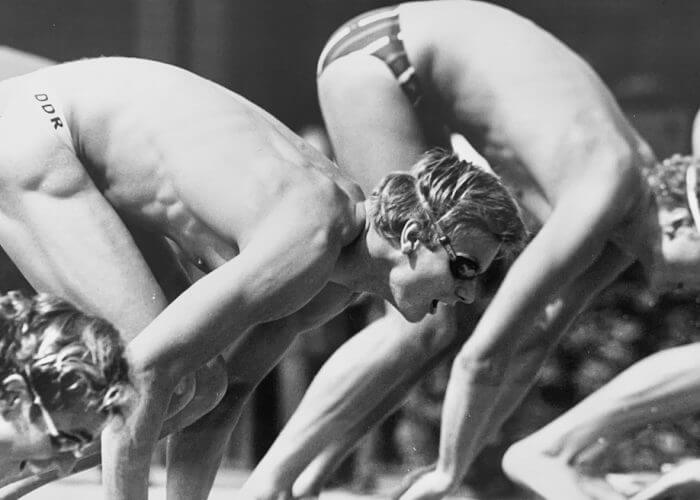
Jörg Woithe of the GDR – Photo Courtesy: NT/CLArchive with permission
1980 Moscow – Men 100m Freestyle – Athletes: 39 Nations: 27
- 50.40 Jorg Woithe GDR
- 50.91 Per Holmertz SWE
- 51.29 Per Johansson SWE
51.34 Sergei Kopliakov URS
51.69 Raffaele Franceschi ITA
51.80 Sergei Krasyuk URS
52.01 Rene Ecuyer FRA
52.22 Graeme Brewer AUS
Date of final: July 27, 1980
Joerg Woithe (GDR) claimed the crown in 50.40 and remains the only East German ever to win a medal in the 100m, with a time slower than the 1976 winning effort. Per Holmertz and Per Johansson took the minor medals to become the first Swedes on the sprint podium since Goran Larsson’s bronze in 1952. Before him, Harald Julin, with bronze in 1908, had been the only sprinter from Sweden to win a medal for the 100m.
The inaugural 1896 Olympic final had been the last one in which Americans had not featured. Three days after the Moscow final, Rowdy Gaines (USA) won his national title in 50.19, a time that reflected a certain degree of depression in a man who had twice clocked 49.61. Chris Cavanaugh took silver behind Gaines in 50.26, while four other men around the world but absent from Moscow clocked times that would have placed them on the podium in the Soviet Union.
On April 3, 1981, Gaines broke the world record in 49.36, 0.08sec inside the standard that had stood to South African Jonty Skinner since 1976. However, a year later at the World Championships, Woithe defeated Gaines 50.18 to 50.21 for the crown.
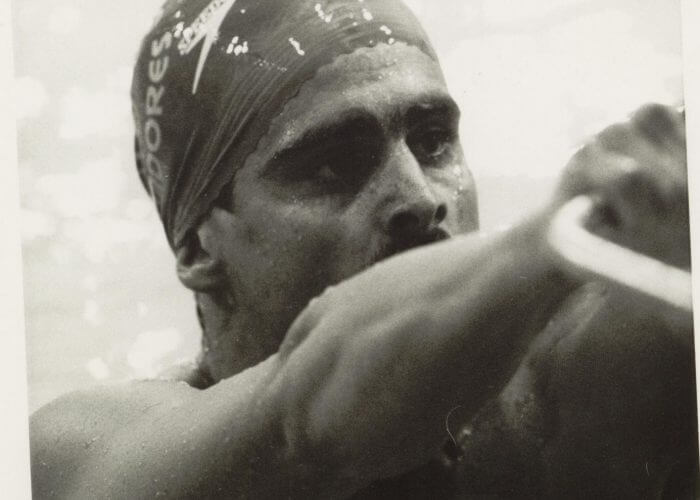
In 1981 – Jesse Vassallo, in recovery mode from the knock of lost chances – Photo Courtesy: Chris Georges
1980 Moscow – Men 400m Individual Medley: Athletes: 23 Nations: 17
1 URS 4:22.89or Alexander Sidorenko
2 URS 4:23.43 Sergei Fesenko
3 HUN 4:24.24 Zoltan Verraszto
4 HUN 4:24.48 Andras Hargitay
5 BRA 4:26.81 Djan Madruga
6 CZE 4:26.99 Miloslav Rolko
7 POL 4:28.89 Leszek Gorski
8 CZE 4:29.86 Daniel Machek
Date of final: July 27, 1980
Pressed by teammate Sergei Fesenko, winner of the 200m butterfly in Moscow, and Hungarian Olympic medallists Zoltan Verraszto and Andras Hargitay, the latter eight years beyond his first Olympic podium in one of the most famous Olympic races in history, Alexander Sidorenko raced to gold in an Olympic record of 4:22.89. His teammate took silver, Verssazto and Hargitay next home, first and fourth just outside 1.5sec of each other.
Key folk were missing. Among them was Jesse Vassallo (USA), 400m medley world record holder in 4:20.05, a time clocked when he won the world title in 1978 ahead of Sergei Fesenko (URS), Andras Hargitay (HUN) and Alexander Sidorenko (URS), in that order.
Three days after the final in Moscow, Vassallo won the US title in 4:21.51. The Olympic crown went to Alexander Sidorenko (URS) in an Olympic record of 4:22.89 ahead of Fesenko, with Hargitay locked out by teammate and training partner Zoltan Verraszto (HUN). In February that year, Sidorenko had set a European record of 4:21.97.



